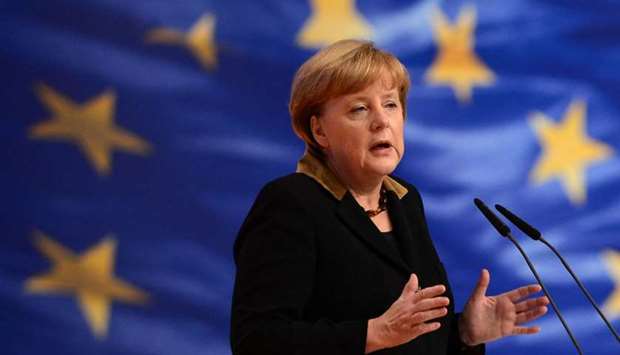Germany intends to use its upcoming six-month EU Council presidency to lead the bloc out of the coronavirus crisis stronger than ever, Chancellor Angela Merkel said yesterday.
“We are aware that Germany’s presidency has particularly high expectations,” said Merkel in her weekly video message. “We want to meet these expectations by working to ensure that we all get out of the crisis together, and at the same time prepare Europe for the future.”
Germany takes over the rotating presidency of the Council of the European Union from July 1.
Merkel said that Germany’s tasks in this period would extend beyond dealing directly with the pandemic and would focus on meeting what the chancellor described as the “three key challenges of our time”.
Climate protection goals would be at the top of Germany’s agenda, along with a digitalisation campaign and renewed efforts to project unified European foreign policy goals to the outside world.
Particular emphasis would be placed on the EU’s relationships with strategic partners such as China, Russia, Turkey and the US.
Maintaining internal unity within the bloc would also remain a focus, Merkel said.
“It will be our job as honest brokers to work towards compromises and solutions among member states,” she said, adding that reconciling the interests of 27 nations was no easy task.
“But we tackle this task with joy and verve,” Merkel concluded.
Speaking earlier yesterday, Foreign Minister Heiko Maas agreed that the bloc had very high expectations for Germany’s presidency and that these had only been heightened by the pandemic.
“We have to lead the European Union out of the crisis in a much stronger position,” he said.
For Maas, the three most important goals for Germany’s presidency are agreement on the multibillion-dollar post-pandemic reconstruction programme and EU budget to 2027, the successful conclusion of the Brexit negotiations with Britain, and the joint positioning of Europe in the power struggle between the United States, China and Russia.
“We only have a chance to assert ourselves in this environment if we do it together as Europeans. Otherwise we will become the pawn of others,” he said.
Meanwhile, Maas said that he could not rule out the possibility that some borders in Europe may have to be closed again in the event of a sharp increase in coronavirus infections, but stressed that this should not happen without a vote.
“It cannot be ruled out that borders will have to be closed again if the infections in one region of the EU are significantly higher than in another,” Maas said in an interview with DPA, adding that such a move would then have to be coordinated across Europe.
At the beginning of the coronavirus pandemic, many EU member states – including Germany – had closed their borders unilaterally.
Almost all borders in the European Union and in the Schengen border-free zone are now open again; the only exceptions are Norway and Finland, which plan to reopen their borders in mid-July.
“Europe has learned a lot in this crisis, not only through our deficits but also through our strengths,” Maas said. “We have improved our coordination and provided solidarity to each other at a pace and dimension that has never been seen before.”

Merkel: It will be our job as honest brokers to work towards compromises and solutions among member states.
